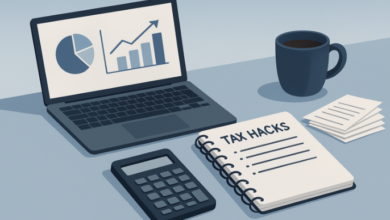
What to Look for in a Small Business Bookkeeper: A Complete Guide
Running a small business is both exciting and challenging. Owners often wear multiple hats—managing operations, handling sales, and keeping customers happy. But when it comes to finances, hiring the right bookkeeper for small business operations can make all the difference. A skilled small business bookkeeper ensures accurate records, smooth cash flow, and compliance with tax regulations, giving owners more time to focus on growth.
This guide will walk you through the essential skills, certifications, and qualities to look for when choosing a bookkeeper for your small business.
Why a Small Business Bookkeeper Matters
Bookkeeping may seem straightforward—recording transactions, managing invoices, and balancing accounts. However, for small businesses, even small financial errors can have major consequences. Missing receipts, inaccurate expense reports, or overlooked tax deductions can hurt profitability and even attract penalties.
A dedicated bookkeeper for small business helps with:
- Tracking income and expenses accurately.
- Maintaining organized financial records.
- Ensuring compliance with tax laws.
- Providing financial reports for smarter decision-making.
- Supporting long-term profitability and growth.
Hiring the right person isn’t just about filling a role—it’s about investing in the financial health of your company.
Essential Skills to Look for in a Small Business Bookkeeper
When hiring a small business bookkeeper, skills are the first thing to evaluate. Look for someone who can handle both the day-to-day transactions and the bigger financial picture.
1. Strong Knowledge of Accounting Principles
Even though bookkeeping is different from accounting, a great bookkeeper understands the basics of financial principles. They should know how debits and credits work, understand cash vs. accrual accounting, and recognize how transactions impact your overall financial statements.
2. Proficiency with Bookkeeping Software
Today’s bookkeeping relies heavily on digital tools. Whether you use QuickBooks, Xero, FreshBooks, or Wave, your bookkeeper should be proficient in these platforms. A tech-savvy bookkeeper can also integrate apps for invoicing, payroll, or inventory tracking—making your system more efficient.
3. Attention to Detail
Bookkeeping is about precision. A reliable small business bookkeeper should be meticulous in entering transactions, reconciling bank statements, and spotting inconsistencies. Even small mistakes can throw off your financial reports.
4. Organizational Skills
From managing receipts and invoices to ensuring tax documents are filed on time, organization is critical. Look for a bookkeeper who maintains well-structured records and can provide you with financial data when you need it.
5. Communication and Reporting Ability
Numbers don’t mean much if they’re not communicated clearly. A great bookkeeper should be able to explain financial reports in plain language, helping you make informed decisions.
Certifications and Qualifications to Consider
While not always required, certifications and qualifications show a bookkeeper’s level of expertise and commitment. When evaluating candidates, consider the following credentials:
1. Certified Bookkeeper (CB)
Offered by the American Institute of Professional Bookkeepers (AIPB), this certification demonstrates a professional level of competence. A CB has proven knowledge in bookkeeping and ethical standards.
2. QuickBooks Certified ProAdvisor
If your business uses QuickBooks, hiring a bookkeeper with this certification ensures they are proficient in the software and can help optimize its use.
3. Accounting or Finance Degree
While not mandatory, a background in accounting or finance adds depth to a bookkeeper’s knowledge, especially when handling complex financial situations.
4. Continuing Education and Training
Bookkeeping practices evolve with technology and tax law updates. A bookkeeper committed to ongoing training will stay current and provide the best service for your business.
See also: Mobile Device Management in Business Environments
Key Qualities of an Excellent Small Business Bookkeeper
Beyond technical skills and certifications, personal qualities determine whether a bookkeeper is the right fit for your business.
1. Trustworthiness and Integrity
Your bookkeeper will handle sensitive financial data. Trust is essential. Look for someone with a reputation for honesty, confidentiality, and ethical practices.
2. Adaptability
Small businesses often face shifting priorities, whether it’s unexpected expenses or growth opportunities. A flexible small business bookkeeper can adapt and provide support during transitions.
3. Problem-Solving Ability
Financial discrepancies happen. A strong bookkeeper won’t just point out a problem—they’ll dig deeper to find the cause and offer solutions.
4. Industry Knowledge
While not always necessary, having experience in your specific industry is a big advantage. For example, a retail business may need expertise in inventory management, while a service-based business may require knowledge of time-tracking and invoicing.
5. Proactive Approach
The best bookkeepers don’t just react to issues; they anticipate them. A proactive bookkeeper can alert you to potential cash flow problems, upcoming tax deadlines, or areas where you’re overspending.
Outsourcing vs. In-House Bookkeeping
When hiring a bookkeeper for small business, you’ll need to decide whether to keep bookkeeping in-house or outsource it to a professional service.
- In-House Bookkeeping: Works well if you prefer direct access to your bookkeeper and have a steady volume of financial transactions.
- Outsourced Bookkeeping: Offers flexibility, reduced costs, and access to specialized expertise without hiring a full-time employee. Many small businesses benefit from outsourcing because it allows them to scale services as they grow.
Both options can be effective, but outsourcing often provides better value for businesses trying to save time and reduce overhead.
Questions to Ask Before Hiring a Small Business Bookkeeper
Before making your choice, ask potential bookkeepers these important questions:
- What bookkeeping software do you specialize in?
- Do you have experience working with small businesses in my industry?
- How do you ensure accuracy and prevent errors?
- What certifications or training do you hold?
- How do you communicate financial updates to business owners?
- Do you offer tax preparation support or coordinate with accountants?
- Can you provide references from other small business clients?
These questions will help you evaluate whether the bookkeeper is the right fit for your unique needs.
Final Thoughts
Choosing the right small business bookkeeper is one of the most important decisions an owner can make. The right professional brings not just technical expertise but also trust, organization, and proactive support. Whether you hire in-house or outsource, your bookkeeper should give you confidence in your numbers and peace of mind to focus on running your business.
By evaluating skills, certifications, and personal qualities, you can find a bookkeeper for small business operations who becomes a true partner in your company’s success.




